Disclosure: Meeple Mountain received a free copy of this product in exchange for an honest, unbiased review. This review is not intended to be an endorsement.
Here at Meeple Mountain, we LOVE designer Uwe Rosenberg. My Meeple Mountain friend and colleague David McMillan writes about Rosenberg titles under our “Ave Uwe” banner, so I’ll adopt that here for this review. (David REALLY loves Rosenberg titles. Trust me!)
While I was composing our profile of Capstone Games last year, Clay Ross handed me a copy of Glass Road, Rosenberg’s 2013 classic that was reissued by Capstone in 2021. I never played the original, so it was exciting to have the chance at the updated version with my circle of gamers.
Glass Road is a Rosenberg game, so you’ll be doing very Rosenberg things: clearing crops, trees and ponds to track production across eight different resources, all in an effort to construct buildings and score end-game victory points. When you set up Glass Road, many experienced gamers will give you that all-knowing look: “it’s a Rosenberg, isn’t it?” Veterans of games like Agricola, Caverna: The Cave Farmers, Le Havre, A Feast for Odin, Hallertau, Nujsford, and so many other Rosenberg games will feel right at home with the game’s setting.
Even the cover image looks like a Rosenberg game, doesn’t it? Here’s what surprised me about Glass Road: it is mainly a hand management game that features very tight, low scores.
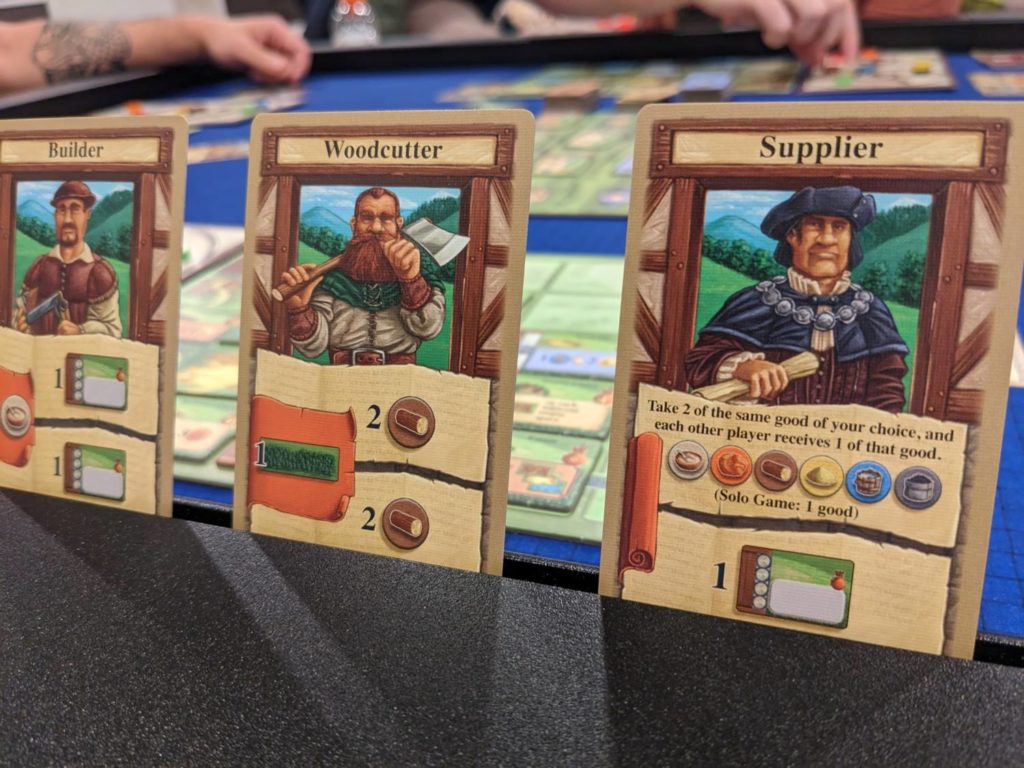
Specialists
Glass Road is played over four rounds. I’ll pretend that Glass Road has a meaningful theme—we are producing glass in Bavaria and we need to gather the right resources to construct buildings and erect a mighty glass-making empire. (There’s even a little backstory on the cover of the rules.)
Uhh, sure. Buildings are the only thing that score points, but it’s the journey that is so satisfying in Glass Road. That’s because the game does hand management so well, a mechanic that’s a staple of many of Martin Wallace’s best games, such as the Brass titles and Age of Industry.
Each player (Glass Road accommodates 1-4 players) has the same hand of 15 Specialists. The cards do a mix of very basic, intuitive things. Pay a resource to get a few different resources; clear a forest to gather some wood. Add a pond, perhaps, then get some resources from that new pond of yours. One card even lets you draft your own private offer of buildings which only you can build on a later turn. Each Specialist card is split in half, providing two different actions when the card is played.
Everyone secretly selects five of their 15 Specialists to use that round. In a three- or four-player game, all players then select one of these five hand cards and place it face down on the table. In player order, a single card is flipped face-up; when a card is revealed, all other players who have the same card in their hand (so, not face down on the table, but still in their hand) must also play that card.
Then, each player executes only that card: the person who led off that turn, and anyone who had it in their hand, gets to choose one of the two card actions to perform. This gives players an opportunity to take a small bonus action if they correctly guessed that someone else might play that card in a round.
If no one else had the card in their hand, the original player gets to execute both halves of the played card. Then the turn moves to the next player. No one can play more than two of their five hand cards as bonus actions in a round, and when all players have had the chance to play three cards as their main action, the round ends. (Rules are slightly modified in a solo or two-player game.)
So, what are you doing with all of these cards? Now is a great time to discuss the Production wheels, which are tracking your glass and brick production as well as the game’s other resources. Glass and brick are the most important ones, though. This is impossible to explain without pictures, so let’s just show you the wheel:
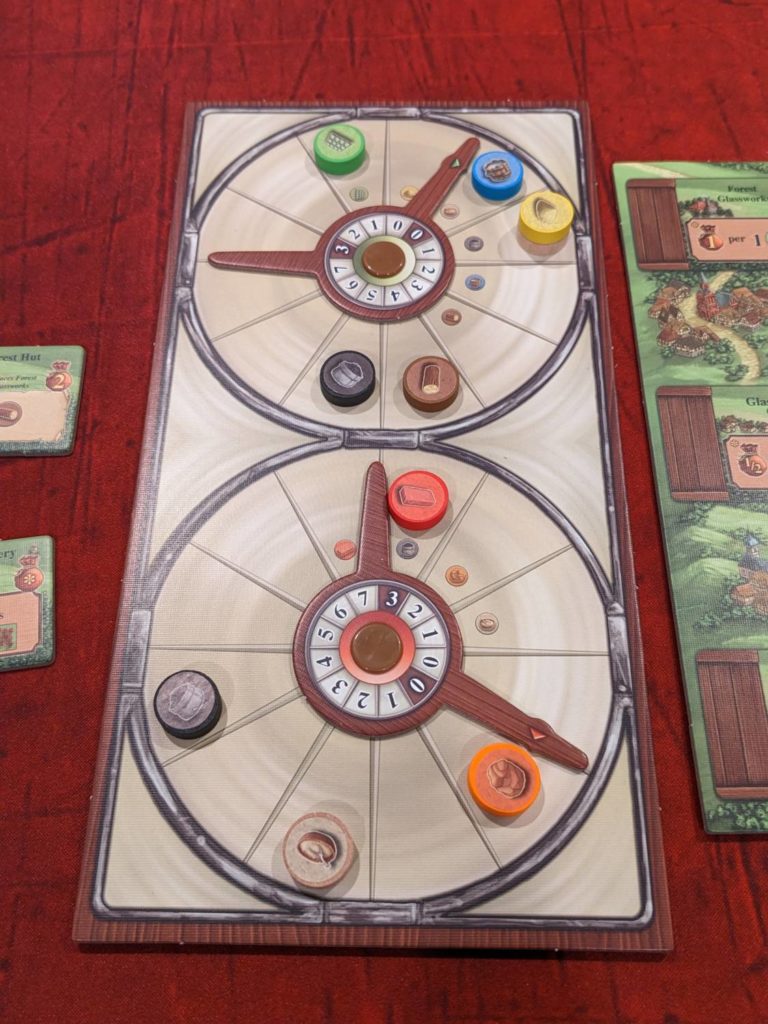
The wheel moves based on when a player has at least one of each minor resource in the game; so, in the case of brick, the dial moves clockwise when a player has at least one of each of that dial’s minor resources: clay, food, and charcoal. The way the dial spins, this can increase your brick resource total to as many as three; this also means that to compensate, you have “spent” some number of each minor resource on that dial.
You’ll need all of these resources to build buildings, trigger actions on your Specialist cards, and take advantage of bonus card opportunities when another player chooses a card you have in hand. This makes the resource management of Glass Road a little more exciting than some of Rosenberg’s other games, and in a very satisfying way. Plus, games of Glass Road are quick, accessible, and easy to score.
All of the game’s building tiles are placed on empty spaces on your player board. Many of the Specialist cards grant players a chance to build a tile from the tile market. Some of the buildings are so familiar that they share a name with some of the tiles in other Rosenberg games. (Is the “Joinery” in every single Rosenberg game??)
Some buildings give you free trade actions to turn resources into different resources. Other buildings grant a large immediate and one-time bonus, while others only count for end-game scoring. All of the buildings have a cost that you’ll spend from your Production wheel, and after four quick rounds, the player with the most points is the winner.
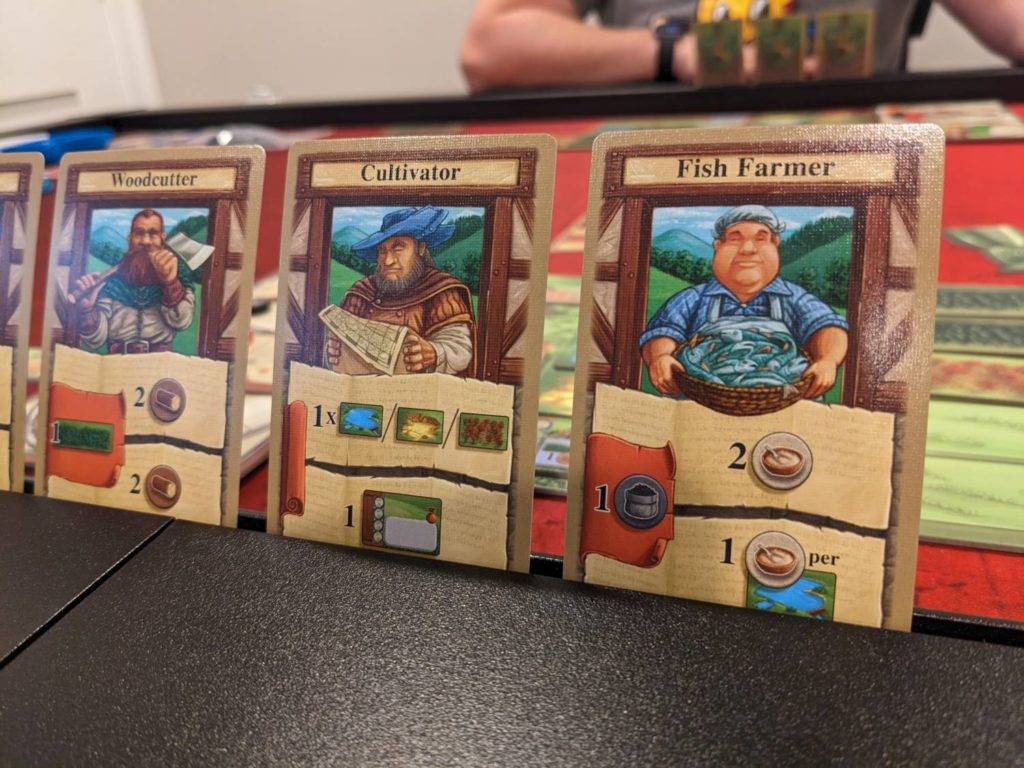
Rosenberg Light
My main issue with games like Agricola—especially playing it in person, versus the excellent app—is the play time. Agricola is a 3-4 hour game in the wrong hands, and longer with new players. Even Caverna: The Cave Farmers—my preference over Agricola—is still gonna run 2-2.5 hours.
Glass Road forces interesting decisions and features a playtime that is under an hour with two or three players, and about 75-90 minutes with four. Solo only takes about 20 minutes once you know how to best use the cards. (I don’t recommend the solo game beyond learning how to play.)
One of my favorite things about Glass Road: it’s incredibly easy to teach. The hardest part: understanding how to manage your resources so that when you up the production on your best resources (glass and brick), you’ll lose one minor resource for every space the dial moves in exchange.
But the game’s best feature, by a country mile, is the way cards are played each turn. It’s a hoot to begin to play a card, then build anticipation with the announcement to the table: “I’m playing…The Supplier?!” in the hopes that no one else also has the Supplier in their hand, allowing the lead player to trigger both of the card’s actions.
Every single turn, that’s a blast. It’s also fun to consider strategy when you are not the first player; if you play a card face-down as a player later in turn order, and someone else forced players to empty their hand of the card you wanted to play, that offers an opportunity to trigger both of a card’s actions.
This might mean that the player who has played Glass Road the most at the table has a leg up. This is true of many games, and I suspect this is the case here. But over the course of four rounds, even new players will begin to suss out what a player might be thinking regarding future actions, and intentionally seeding your hand with a card that you’re sure a neighbor will play is a legitimate strategy here. Everyone loves follow/bonus actions if they don’t slow down the game, and in Glass Road, this follow mechanic keeps play moving.
The back of the box announces that Glass Road is “also an excellent two-player game!”, and I agree. There’s one change to how cards are played from hand, as opposed to face-down on the table, but this is otherwise the same game. However, I think the best moments of Glass Road take place at the highest player counts.
Very highly recommended, particularly for players who usually look at Rosenberg’s name on the box and worry if they will have to choose between a five-hour game or getting a good night’s rest. In the words of Goldilocks, Glass Road is just right, and it sprints past some of the slower, more strategic games in Rosenberg’s catalog.


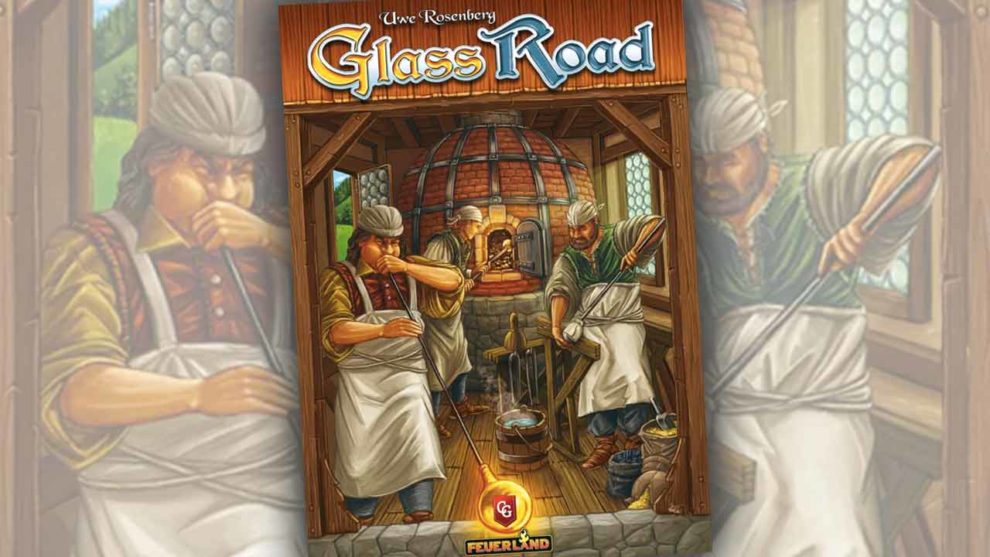


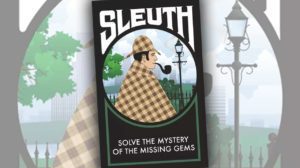
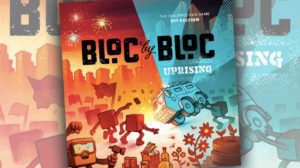





Add Comment